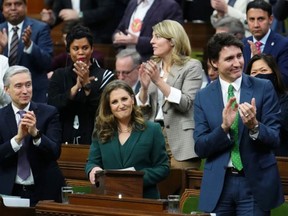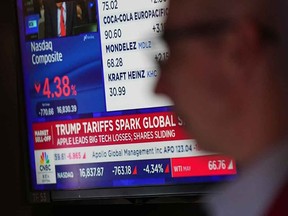Trudeau needs a solid, simple economic story to tell voters and it will be up to his top lieutenant to devise it
Article content
Ahead of Prime Minister Justin Trudeau’s cabinet shuffle last month, there was — for a brief Ottawa minute — speculation the government shakeup would include the departure of Deputy Prime Minister Chrystia Freeland, who also serves as the country’s finance minister.
Trudeau was ultimately spared the prospect of losing his top lieutenant at a time when the governing Liberals are badly trailing in the polls.
Advertisement 2
Article content
Article content
Yet, as Canada’s finance minister enters her fourth year at the helm of the nation’s economy (Aug. 18 marked her third anniversary), Freeland’s continued tenure at the post raises new questions: What’s the next order of business? Where’s the agenda? What’s the purpose of staying?
What, in other words, is her second act?
The big legacy decisions — including two new entitlement programs — are in her rearview mirror. Looking ahead, there are few policy levers left to pull.
The government will be handcuffed by an already bloated spending profile, higher debt and other constraints that come with slowing growth and a higher interest rate environment. This means learning to live with less — a message that Freeland will surely take to a cabinet retreat in Charlottetown starting Aug. 21.
There are things that still need to be done, to be sure, such as executing on already budgeted policy decisions.
Trudeau is also facing pressure to do more on housing affordability, including measures to bolster supply and stem the surge of temporary foreign residents that have come into the country. The Liberals will need to offer something to the NDP in next year’s budget, in order to keep their support in Parliament. More immediately, the government has to execute on regulations and legislation needed to put its climate transition plan into action.
Article content
Advertisement 3
Article content
The Liberals also have to leave enough room in the fiscal envelope to put something in the window for voters in the next election.
All this limits the financial scope to do any more big things.
The toughest challenge going forward for Freeland could be on the communication front — how to turn a policy record worth hundreds of billions into votes.
The Liberals appear to be losing the narrative war on the economy, and struggling to counter a growing wave of negativity. This is being led not only by the opposition parties but increasingly by elite opinion, which is always an important driver of Liberal sensibilities.
While critics can pick at the veracity of his assertions, there’s no denying Conservative Party leader Pierre Poilievre threads a pretty solid storyline around how an overreaching government has stoked consumer prices and driven up interest rates, making life unaffordable for Canadians. It’s that simple.
In comparison, Liberal economic messaging can sound wonky, off-kilter, behind the curve and often incoherent. This applies across the board — in the way Liberals talk about everything from inflation and climate change to immigration.
Advertisement 4
Article content
Take immigration. Federal efforts to ramp up international migration have had the unintended secondary effect of aggravating Canada’s housing affordability crisis and driving interest rates higher than they need to be, which in turn acts as a drag on housing investment just when we need supply the most.
Yet, the Liberals contend that Canada should maintain elevated levels of international migration now in order to find workers to build homes for all these new migrants to live. There’s an incongruity that grates.
The communications challenge is not unique to Trudeau’s government.
Many incumbents elsewhere are finding the electorate in a grumpy mood following the pandemic downturn and ensuing inflation.
U.S. President Joe Biden’s administration has spent the better part of the summer trying to garner more credit for a relatively strong U.S. economy. He’s been criss-crossing the U.S. to promote what his administration is dubbing Bidenomics — a catchall for his industrial strategy-driven economic policies.
Results have been mixed, but the assertiveness and boldness of Biden’s narrative-building makes anything the Trudeau government has done on the communications front look utterly timid by comparison.
Advertisement 5
Article content
There’s definitely fodder for the Liberals to weave a positive and unapologetic story.
While three years doesn’t put her in the top echelon of the longest-servicing finance ministers, Freeland has already done enough to shape a legacy as an activist policy maker. The Liberals emerged from the pandemic in a virtuous mood, launching dental-care and child-care programs and putting the public purse fully behind climate-change efforts. Program spending and revenue as a share of the economy have been permanently raised under Freeland.
To some, that poses a risk and is a problem. Other more like-minded voters will see it as the right stance in a world that increasingly values resiliency and requires government to be at the centre of the economic agenda.
Freeland and Trudeau are facing serious questions about lagging productivity and underlying strength of the economy, and trepidation remains the prevailing mood in the country’s C-suites. But Freeland has delivered, too, for big business — meeting their demands for child care, looser immigration and subsidies for green investment.
Advertisement 6
Article content
The debate over fiscal sustainability will dog the Liberals as long as interest rates remain high, but there’s no sign of a debt crisis yet and Freeland can continue to claim her plan is prudent.
Canada’s economy, meanwhile, has had more momentum than expected throughout Freeland’s tenure and growing faster than other advanced countries. Canadians on average are largely better off wealth-wise than they were a few years ago.
Over the next year, as he prepares to fight his fourth election, Trudeau will need a more cohesive and simpler economic story to tell that does a better job of highlighting where Canada is thriving, not failing, and how his government is leading and not reacting.
As finance minister, that task ultimately falls on Freeland.
Theo Argitis is managing director at Compass Rose Group
Article content
Finance minister Chrystia Freeland’s second act still unclear
2023-08-18 18:12:07






Comments
Postmedia is committed to maintaining a lively but civil forum for discussion and encourage all readers to share their views on our articles. Comments may take up to an hour for moderation before appearing on the site. We ask you to keep your comments relevant and respectful. We have enabled email notifications—you will now receive an email if you receive a reply to your comment, there is an update to a comment thread you follow or if a user you follow comments. Visit our Community Guidelines for more information and details on how to adjust your email settings.
Join the Conversation